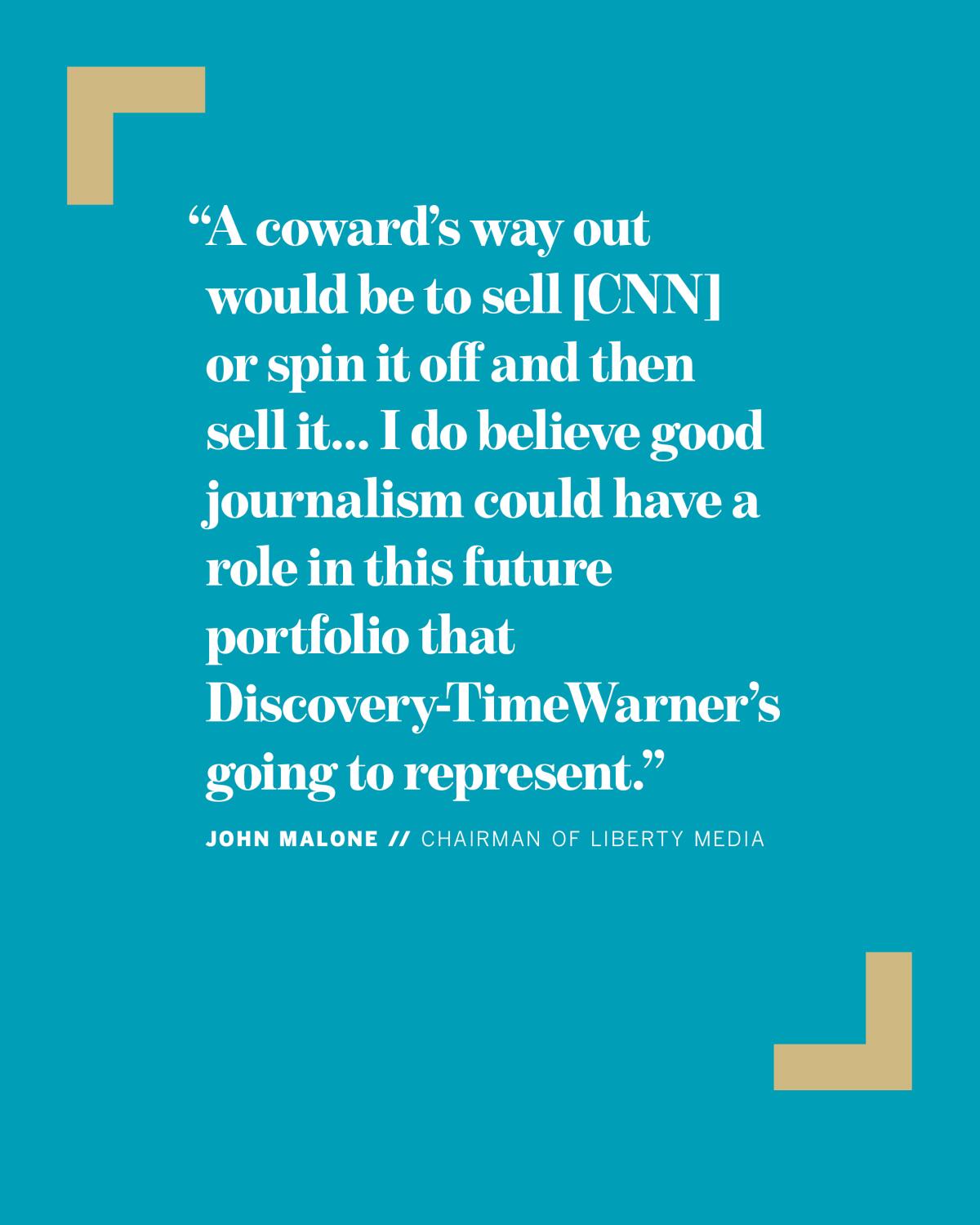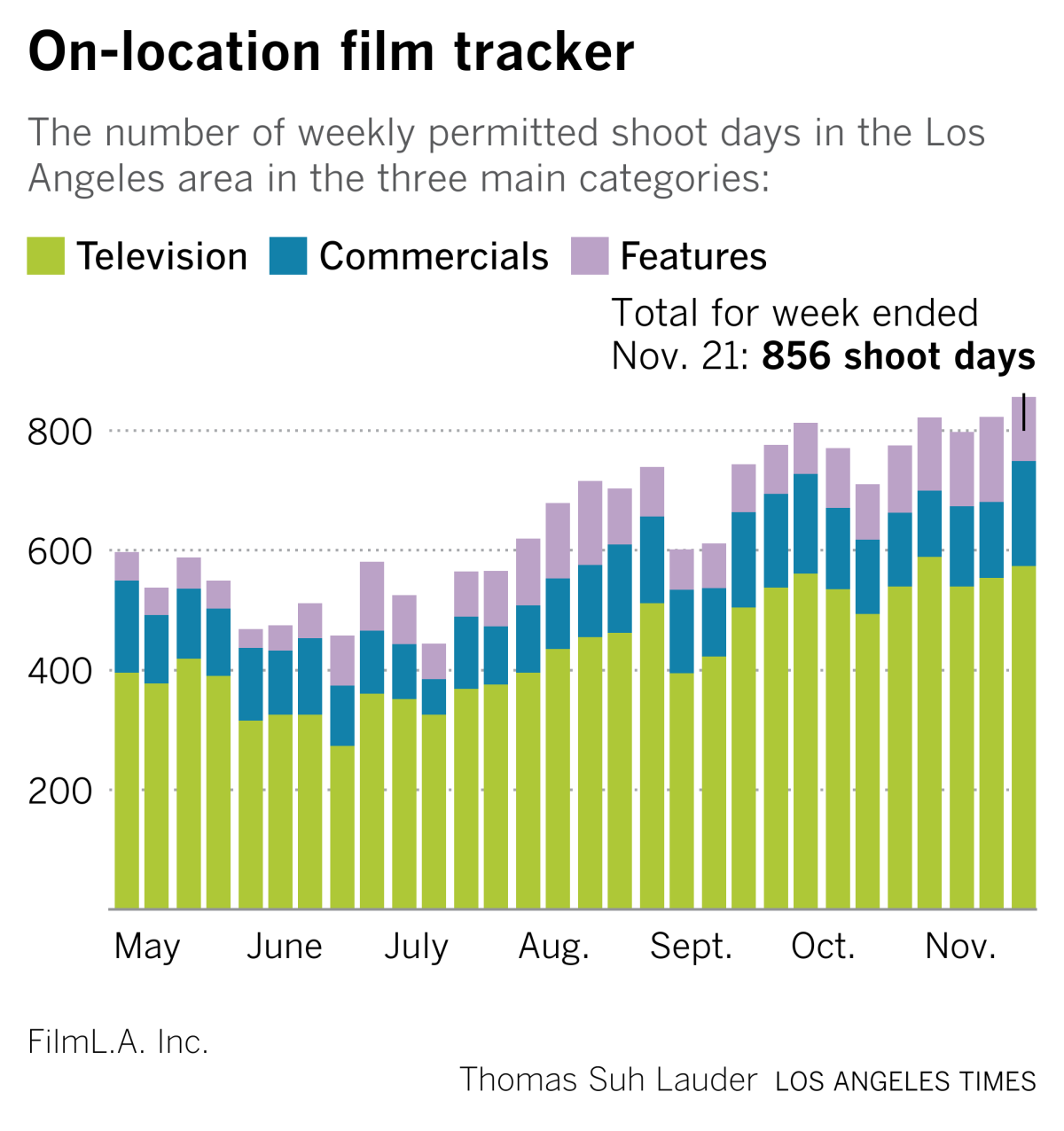The ‘Pulp Fiction’ NFT fight isn’t really about NFTs

- Share via
This is the Nov. 23, 2021, edition of the Wide Shot, a weekly newsletter about everything happening in the business of entertainment. Sign up here to get it in your inbox.
There’s something ironic about Quentin Tarantino wanting to sell NFTs, or non-fungible tokens, related to one of his most important movies.
The director who bought the classic Vista Theatre in Los Feliz and adores 70-mm film projection also wants to sell digitally scanned pages of his handwritten “Pulp Fiction” script as crypto collectibles on a blockchain. Talk about intersecting plotlines!
Anyway, Miramax, the studio that released “Pulp Fiction” in 1994, is having none of it. The company sued the director last week, accusing Tarantino of breach of contract, copyright infringement and trademark infringement.
Miramax says Tarantino, who won an Oscar for writing “Pulp Fiction’s” screenplay, doesn’t have permission to sell the NFTs under the terms of his 1993 contract with the company and didn’t consult the studio before forging ahead. Tarantino’s lawyer Bryan Freedman says the filmmaker is allowed to sell the images under his “reserved rights.”
As a refresher, NFTs are basically certificates of authenticity that are tracked on a public ledger, giving people a reliable way to prove ownership of one-of-a-kind art, memorabilia and other items. But they’re not the artifacts themselves. An NFT is more like the deed than the house.
Tarantino earlier this month announced plans to sell NFTs containing “secret” content viewable only by the owner, including “the uncut first handwritten scripts of ‘Pulp Fiction’ and exclusive custom commentary from Tarantino, revealing secrets about the film and its creator.”
Although the dispute is fascinating, it may not turn out to be a landmark case for copyright and trademark law in the NFT age.
Aaron Moss, an intellectual property attorney at Greenberg Glusker who’s an expert in entertainment cases, wrote in a blog post that this wasn’t really much of a copyright dispute at all and didn’t even have all that much to do with the weird nature of NFTs. It’s more a matter of interpreting Tarantino’s contract.
“NFTs are clearly the bright shiny object that’s driving the parties to court and attracting public interest in the lawsuit,” Moss wrote. “But the less-shiny reality is that this is primarily a contract dispute — a fight about whether the publication rights Quentin Tarantino reserved in his agreement with Miramax include the right to sell digital screenplay scans.”
The case will hinge on whether the digital items attached to the NFTs fall under rights Tarantino retained in his deal with the studio, which include the soundtrack album, music publishing, live performance, print publication and interactive media rights. Crucially, the print publication rights in this case include “screenplay publication,” according to the contract language included with Miramax’s suit.

Under the terms of the contract covering “screenplay publication,” Tarantino can sell the “Pulp Fiction” script in book form or publish a making-of book or novelization, Moss said.
“The question,” he wrote, “is whether selling ‘1 of 1’ digital scans of pages from the screenplay falls within Tarantino’s publication rights or, conversely, constitutes the sale of something else, such as merchandise, that he assigned to Miramax.”
The dispute is really just a crypto-infused update of an age-old story: studios and artists battling to capitalize on famous work. Tarantino’s plan is another example of artists trying to use this increasingly popular type of asset to make money from existing work and promote themselves to a rabid audience.
But NFTs are a potential revenue stream for studios too, which have taken advantage of the boom by selling commemorative tokens tied to “The Matrix Resurrections,” “No Time to Die,” “Space Jam: A New Legacy” and “Ghostbusters: Afterlife.” That’s how NFTs of “Mini-Pufts” (or tiny Stay Puft marshmallow men) came into being.
Miramax isn’t the only company asserting rights amid the NFT craze. My colleague Matt Pearce in April wrote about how comic book publishers including DC were clamping down on illustrators trying to sell digital superhero artwork as NFTs.
The Tarantino-Miramax could settle, like most entertainment lawsuits. The collectibles are expected to be sold next month, so there’s not much time for Miramax to make its next move, which would be to file a motion for preliminary injunction or apply for a temporary restraining order.
“I have a sneaking suspicion that Tarantino’s folks and Miramax’s folks will figure out a way where everyone can make money, because that’s the easiest path,” said Oklahoma City-based patent attorney T.J. Mantooth, who follows intellectual property cases.
It remains to be seen whether NFTs turn out to be the future of Hollywood collectibles or just another faddish hustle promoted by the financial gurus on TikTok. But these conflicts will certainly keep lawyers’ briefcases full.
Latest on ‘Rust’
The Alec Baldwin western “Rust” was supposed to be a major career break for armorer Hannah Gutierrez Reed and prop master Sarah Zachry, both 24 years old.
Now they’re at the center of the investigation into the fatal shooting that killed cinematographer Halyna Hutchins. My colleagues Julia Wick, Meg James, Amy Kaufman and Anousha Sakoui wrote a detailed piece about what led these individuals, who had scant experience, to that tragic day.
Further reading: Should guns be banned from film sets? Professional armorers push back to save their jobs after “Rust.”
More stuff we wrote
— Kevin Spacey lost in arbitration in his legal battle with “House of Cards” producer MRC. The company was awarded $31 million.
— Where is Peng Shuai? A #MeToo case pits women’s tennis against Chinese censorship.
— Net-flex. Netflix releases top 10 lists by hours viewed for its programming, sharing data in a way that smaller streaming services refuse to do. Why? Because it looks good. Also, Netflix bought a VFX studio.
— Two former Netflix employees who criticized Dave Chappelle’s “The Closer” withdrew a complaint they lodged with the National Labor Relations Board alleging the streamer tried to stop them from speaking up.
— Explaining Hollywood: Your child wants to act. What do you need to know?

Number of the week

CJ ENM, the South Korean entertainment company behind the best picture Oscar winner “Parasite,” is acquiring most of Endeavor Content’s scripted entertainment business in the latest expansion of the Seoul-based company’s Hollywood ambitions.
The company will pay $775 million for its 80% stake, valuing the Endeavor business known for “Killing Eve” at about $970 million.
Endeavor had to sell to someone because of its agreement with the Writers Guild of America to reduce its stake in the production company, which writers viewed as a conflict of interest, to 20%. The interesting part is whom they sold to.
CJ Group and its vice chair, Miky Lee, who led the company to invest in DreamWorks SKG in the mid-1990s, have been making splashy moves in entertainment lately, including an investment in Skydance Media. With the explosive popularity of South Korean programming including Netflix’s “Squid Game,” look out for more deals from the mogul.
‘Bad Moms,’ worse merger
Last year, film studio STX Entertainment, known for “Hustlers,” “Bad Moms” and “Ugly Dolls,” merged with Indian entertainment company Eros International in a deal that executives said would create massive opportunities through global streaming, content, etc. Well, the combined company last week said it was looking to split up the marriage.
ErosSTX said in a news release the company had “entered into exclusive negotiations with a third party for the sale of its STX Entertainment subsidiary. ... There can be no assurance that the negotiations or any process will result in a transaction.”
The firm’s stock tanked. ErosSTX’s chief executive, Bob Simonds, the producer who founded STX Entertainment, could not be reached for comment. The company did not identify the third party in the discussions.
The ErosSTX merger has been messy. Eros has faced questions over its accounting practices that predate its combination with STX. In August, the company said it could not deliver its annual report on time because of “a formal internal review of certain accounting practices and internal controls related to its Eros subsidiaries.” At the same time, STX disclosed it was in negotiations to monetize its film library to pay off debt.
Quoteworthy

“A coward’s way out would be to sell [CNN] or spin it off and then sell it.... I do believe good journalism could have a role in this future portfolio that Discovery-TimeWarner’s going to represent.” — John Malone
Billionaire media mogul John Malone, in an interview with CNBC, opined on what the future of CNN could look like after parent company WarnerMedia merges with Discovery Inc. to create Warner Bros. Discovery. Malone, chairman of Liberty Media, is a Discovery shareholder and board member.
Best of the web
Note: Some links may require a subscription to read.
— The Wall Street Journal’s investigation into Activision CEO Bobby Kotick. The top executive didn’t inform the board of misconduct claims, including alleged rapes; the company faces multiple regulatory investigations, the paper says.
— Time out for Time’s Up? The group will “completely rebuild” after criticism for its role in the Andrew M. Cuomo sexual harassment accusations. (Washington Post)
— Scarlett Johansson touts the “positive impact” of her Disney lawsuit as Kevin Feige announced a secret Marvel Studios project with her as producer. Guess it worked out for Black Widow! (Hollywood Reporter)
— Related, sort of ... this Sonny Bunch column: Please stop asking film directors about Marvel movies. (Washington Post)

Hollywood production
Shoot days in the Los Angeles area reached another pandemic high last week as all three main categories — film, television and commercials — posted strong numbers, according to FilmLA.

Finally ... Wide Shot coin?
The deal to rename the Staples Center after Crypto.com minted many funny tweets, but bonus points go to Franklin Leonard for his expert use of the exasperated LeBron GIF. As always, NFTs of this newsletter are available for one bajillion Shiba Inu.
For non-crypto/NFT enjoyment, check out this video from director James Gunn showcasing behind-the-scenes stunt work for “The Suicide Squad.”
Also, I’m hosting Thanksgiving for the first time this year, so if you have any Turkey Day disaster stories or good music suggestions, please send to ryan.faughnder@latimes.com.
Inside the business of entertainment
The Wide Shot brings you news, analysis and insights on everything from streaming wars to production — and what it all means for the future.
You may occasionally receive promotional content from the Los Angeles Times.




